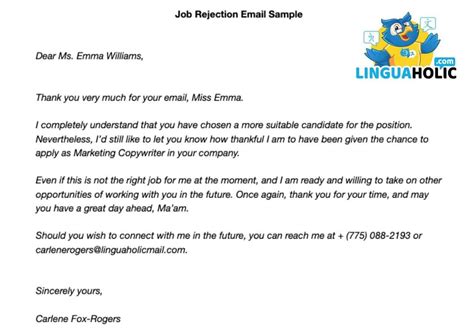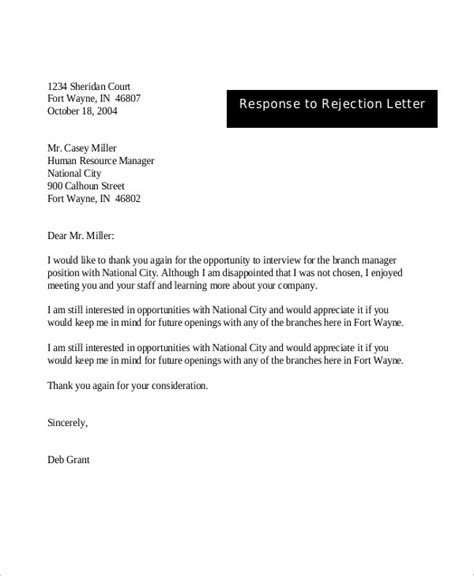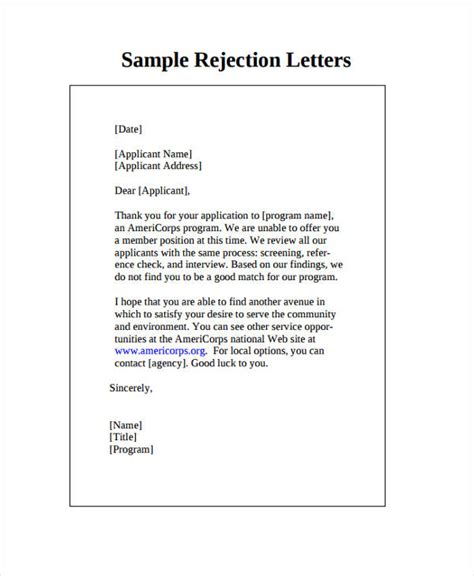How To Reply To A Job Rejection Email

Receiving a job rejection email can be a disappointing experience, but it is an inevitable part of the job search process. While it may sting initially, it's essential to remember that rejections are common and should not deter you from pursuing your career goals. Instead, focus on learning from the experience and improving your approach for future opportunities. Here's a comprehensive guide on how to navigate and respond to job rejection emails professionally and productively.
Understanding the Rejection

When faced with a job rejection, the first step is to carefully read and comprehend the email. Rejection emails often provide valuable feedback and insights into why you were not selected for the position. Pay attention to the specific reasons mentioned, as they can help you identify areas for improvement and make better choices in your future applications.
Common reasons for rejection include:
- Lack of Experience or Skills: The employer might have received a large number of qualified applicants, and your experience or skill set might not have aligned perfectly with their requirements.
- Competitive Applicant Pool: In some cases, the competition for the role was exceptionally high, and your application, despite being strong, was outshone by other exceptional candidates.
- Fit and Culture: The company might have felt that your personality or work style did not align with their team dynamics or organizational culture.
- Timing and Availability: If you were applying for a role that required immediate availability, and you couldn't start right away, that could have been a deciding factor.
Understanding the reason for rejection can help you tailor your approach and strategy for future job applications.
Crafting a Professional Response

Even though you may feel discouraged, it’s crucial to respond to the rejection email professionally. Your response can leave a lasting impression on the hiring team and even open doors for future opportunities. Here’s how to craft an effective reply:
- Thank the Recruiter: Begin your response by expressing gratitude for the time and consideration they invested in reviewing your application. A simple "Thank you for taking the time to inform me of your decision" is an appropriate way to start.
- Request Feedback: If the rejection email doesn't provide specific reasons, politely ask for feedback. This shows your eagerness to improve and learn. You can say, "I'd appreciate any feedback you can provide on my application to help me grow professionally."
- Highlight Your Interest: Even if you weren't selected for this role, emphasize your continued interest in the company and its mission. You might say, "While I'm disappointed, I remain excited about the work [Company Name] is doing and would love to stay connected for future opportunities."
- Offer a Solution: If there were specific skills or experiences that you lacked, consider offering a solution. For instance, if you were rejected due to a lack of technical skills, you could mention, "I understand the importance of these skills and am committed to developing them. I'd be happy to share my progress and discuss potential opportunities in the future."
- Keep it Brief and Polite: Your response should be concise and respectful. Avoid coming across as overly pushy or argumentative. A professional tone and a sincere expression of gratitude go a long way.
Learning and Growing from the Experience
Job rejections are not failures but valuable learning opportunities. Use the feedback you receive to enhance your job search strategy and make yourself a stronger candidate.
Improving Your Resume and Cover Letter
Review your resume and cover letter to ensure they are well-written, error-free, and tailored to the specific job requirements. Highlight your relevant skills and experiences, and consider seeking feedback from career counselors or peers.
Enhancing Your Interview Skills
If you made it to the interview stage but were ultimately rejected, reflect on your performance. Practice your interview skills, seek feedback from mock interviews, and work on improving your communication and presentation skills.
Expanding Your Network
Rejections can sometimes open doors to new connections. Reach out to the hiring team or recruiter to thank them for their time and express your continued interest in the company. Building a positive relationship can lead to future collaborations or recommendations.
Staying Motivated and Persistent
Job searching can be a lengthy and challenging process. It’s essential to stay motivated and persistent. Set small goals, celebrate your achievements, and keep learning and growing. Remember that every rejection brings you one step closer to finding the perfect role.
Conclusion
Job rejections are an integral part of the job search journey, but they shouldn’t define your career path. By understanding the reasons for rejection, crafting professional responses, and learning from each experience, you can turn rejections into opportunities for growth and improvement. Stay positive, keep pushing forward, and your dream job will be within reach.
How should I handle multiple rejections?
+Receiving multiple rejections can be disheartening, but it’s essential to maintain a positive outlook. Analyze each rejection to identify common themes or areas for improvement. Use this information to update your resume, cover letter, and interview skills. Stay persistent, and keep applying for roles that align with your skills and interests.
What if the rejection email doesn’t provide any feedback?
+In such cases, it’s perfectly acceptable to politely follow up and request feedback. You can send an email expressing your gratitude for their time and asking if they could provide any insights that might help you improve your application for future opportunities. Remember to keep the tone professional and respectful.
Is it appropriate to ask for feedback on rejected applications?
+Absolutely! Asking for feedback is a sign of maturity and a willingness to grow. Most recruiters appreciate this approach and are often willing to provide insights. It shows that you’re taking your career seriously and are committed to self-improvement.



